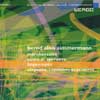Zimmermann Early Orchestral Works
Fascinating landmarks on Zimmermann’s journey to the avant-garde
View record and artist detailsRecord and Artist Details
Composer or Director: Bernd Alois Zimmermann
Genre:
Orchestral
Label: Edition Bernd Alois Zimmermann
Magazine Review Date: 2/2003
Media Format: CD or Download
Media Runtime: 75
Mastering:
Stereo
DDD
Catalogue Number: WER6656-2

Tracks:
| Composition | Artist Credit |
|---|---|
| Canto di speranza |
Bernd Alois Zimmermann, Composer
Berlin Radio Symphony Orchestra Bernd Alois Zimmermann, Composer Lucas Fels, Cello Peter Hirsch, Conductor |
| Märchensuite, 'Fairytale Suite' |
Bernd Alois Zimmermann, Composer
Berlin Radio Symphony Orchestra Bernd Alois Zimmermann, Composer Peter Hirsch, Conductor |
| Impromptu |
Bernd Alois Zimmermann, Composer
Berlin Radio Symphony Orchestra Bernd Alois Zimmermann, Composer Peter Hirsch, Conductor |
| Alagoana - Caprichos Brasileros |
Bernd Alois Zimmermann, Composer
Berlin Radio Symphony Orchestra Bernd Alois Zimmermann, Composer Peter Hirsch, Conductor |
Author: Arnold Whittall
This disc surveys Bernd Alois Zimmermann’s rarely heard orchestral compositions from the years 1950 to 1958 – years which saw the trans-formation of his style from neo-classical to avant-garde and led up to the conception of his masterpiece, the opera Die Soldaten. It’s also a valuable reminder that the kind of sweeping generalisation found in my first sentence is inevitably inadequate, when it comes to trying to pin down the character and quality of music as complex in mood and texture as Zimmermann’s so evidently was.
Both Märchensuite (‘Fairy-Tale Suite’) and Alagoana, a ballet score named after a region of Brazil, blend those light and dark tendencies which give Zimmermann’s music its characteristic tone. Märchensuite veers between steely Stravinskianisms and a well-nigh Straussian lushness, while Alagoana passes a wide range of allusions, including South American idioms and symphonic jazz, through the filter of Zimmermann’s always characterful, though at times inflated orchestral writing. Märchensuite is heavily orchestrated, too, but with shorter sections the result seems more disciplined, if less individual than the most haunting moments of Alagoana: the ending of the central ‘Saudade’, for example.
To move directly from Märchensuite to Canto di speranza is to appreciate the suddenness with which Zimmermann sought to abandon the old musical world for the new. Yet at a time when the avant-garde running in Germany was being made by Stockhausen’s Gruppen, Zimmermann’s 1957 revision of his 1953 cello concerto was bound to seem unsure of itself, groping in the dark for a convincing tone of voice. Zimmermann was never a natural pointillist, and it was only with Die Soldaten that he found a convincing way of shaping ideas and structures that had as little to do with Stockhausen-style fragmentation as with his own earlier neo-classicism. The short orchestral Impromptu (1958) signals the early stages of the opera’s evolution, and although its glimpses into Zimmermann’s musical future are only intermittent, it can now be heard as a prelude to much that is most powerful and enduring in those later works.
These radio recordings do not offer particularly refined sound quality, but the performances are effective in the way they delineate the music’s weight and shape. This is primarily a disc for anyone interested in what came before the music of Zimmermann’s that really matters. But it’s also fascinating in its own right.
Both Märchensuite (‘Fairy-Tale Suite’) and Alagoana, a ballet score named after a region of Brazil, blend those light and dark tendencies which give Zimmermann’s music its characteristic tone. Märchensuite veers between steely Stravinskianisms and a well-nigh Straussian lushness, while Alagoana passes a wide range of allusions, including South American idioms and symphonic jazz, through the filter of Zimmermann’s always characterful, though at times inflated orchestral writing. Märchensuite is heavily orchestrated, too, but with shorter sections the result seems more disciplined, if less individual than the most haunting moments of Alagoana: the ending of the central ‘Saudade’, for example.
To move directly from Märchensuite to Canto di speranza is to appreciate the suddenness with which Zimmermann sought to abandon the old musical world for the new. Yet at a time when the avant-garde running in Germany was being made by Stockhausen’s Gruppen, Zimmermann’s 1957 revision of his 1953 cello concerto was bound to seem unsure of itself, groping in the dark for a convincing tone of voice. Zimmermann was never a natural pointillist, and it was only with Die Soldaten that he found a convincing way of shaping ideas and structures that had as little to do with Stockhausen-style fragmentation as with his own earlier neo-classicism. The short orchestral Impromptu (1958) signals the early stages of the opera’s evolution, and although its glimpses into Zimmermann’s musical future are only intermittent, it can now be heard as a prelude to much that is most powerful and enduring in those later works.
These radio recordings do not offer particularly refined sound quality, but the performances are effective in the way they delineate the music’s weight and shape. This is primarily a disc for anyone interested in what came before the music of Zimmermann’s that really matters. But it’s also fascinating in its own right.
Discover the world's largest classical music catalogue with Presto Music.

Gramophone Digital Club
- Digital Edition
- Digital Archive
- Reviews Database
- Full website access
From £8.75 / month
Subscribe
Gramophone Full Club
- Print Edition
- Digital Edition
- Digital Archive
- Reviews Database
- Full website access
From £11.00 / month
Subscribe
If you are a library, university or other organisation that would be interested in an institutional subscription to Gramophone please click here for further information.




